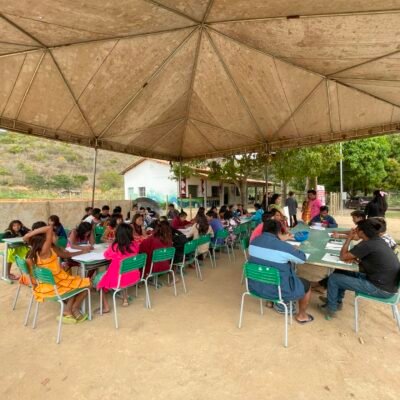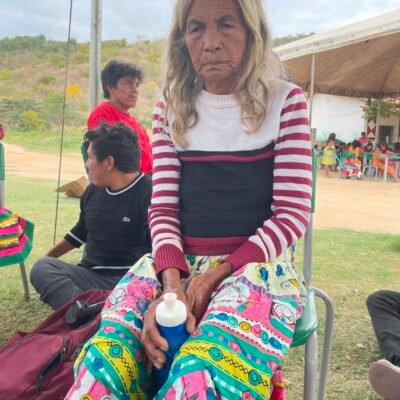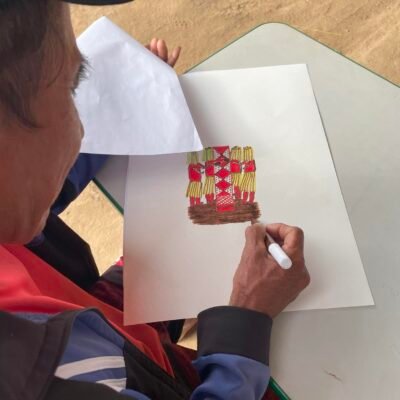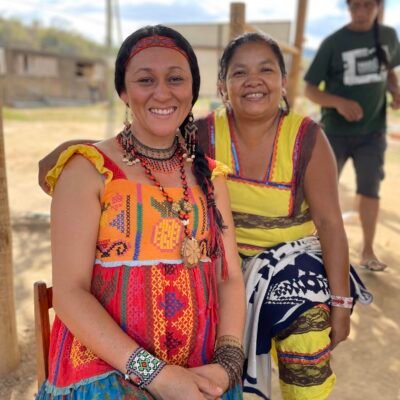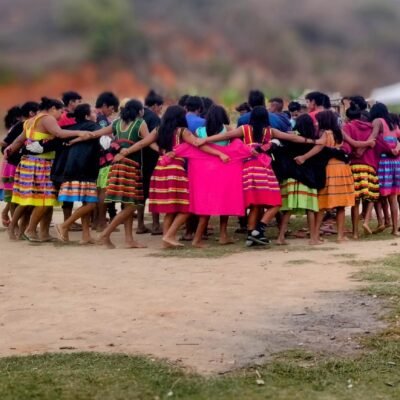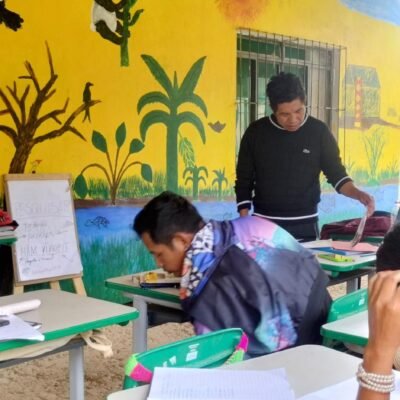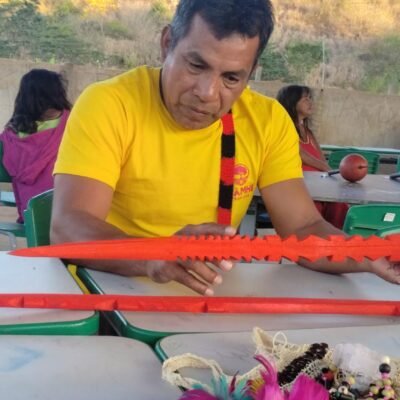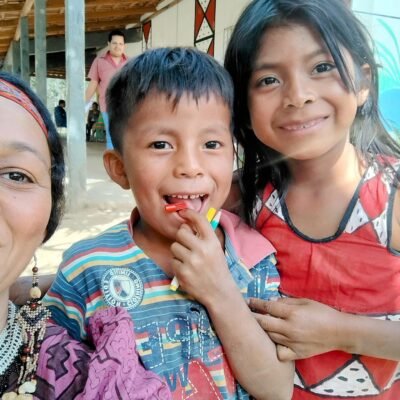
FOREST SCHOOL VILLAGE
MAXAKALI LIVING SCHOOL
Territory: Forest School Village - 122 hectares
Population benefited: 327 Maxakali people
Coordinators: Sueli and Isael Maxakali
The Maxakali are ancestral inhabitants of the forests that used to cover the whole of the Pardo, Jequitinhonha and Mucuri rivers, in the region that today comprises the north-east of Minas Gerais and the extreme south of Bahia.
They are a people of approximately 3,000 who speak the Maxakali language, one of the last native languages of the region. The invasion of their original lands by agricultural companies during the 19th and 20th centuries resulted in them being confined to five small territories, surrounded on all sides by farms and devastated by the felling of the forest and the planting of colonião grass, a pasture plant.
The Forest School Village is the most recent territory of this people and was created from the retaking of a federal property, located in the rural area of Teófilo Otoni (MG), where an old dream began to take shape, driven by the Maxakali's demand for their original territories and the longing they feel for the rivers, the hunting and the great forest.
The Forest School Village is a community project, now recognised as Indigenous Land. Sueli Maxakali says that there is no action that is not collective.
Isael Maxakali often says that the true home of the Maxakali, the ‘real village’, can only exist together with the forest, which is the home of the yãmïyxop. Isael also says that living in these places - in the village and in the forest - is the best way to educate their children and pass on their traditional knowledge.
Village and forest are therefore their LIVING SCHOOLS.
Cristine Takuá and Paula Berbert
My people are the People of the Spirit of the Song. Because our people are people of resistance, because the spirits strengthen us. It was the Portuguese who gave us the name Maxakali - they wanted to extinguish our people, but the spirit of Pajé [Shaman] Yãmïy was talking to his son and warned him
that the Portuguese were coming. They split up and went to live
in two caves. The film Essa Terra é Nossa [This Land is Ours] shows this.
It was the Spirit of the Song that protected my people.
They said: ‘Either the land or the language’. They chose the language.
Sueli Maxakali
The FOREST-SCHOOL-VILLAGE community project consists of organising the village, the school, reforestation, caring for the springs, regular meetings of shamans and cultural specialists, as well as structuring workshops.
MONTHLY SUPPORT:
The resource has been fundamental for structuring the Forest School Village. It is used to install and maintain the internet, install electricity in the houses, hoses to supply each house with water from the spring, art materials, workshops, as well as collective meals and necessary transport.
NEXT STEPS:
Create opportunities for workshops.
Articulate partnerships and exchanges.
Collaborate on the creation of the houses designed for collective organisation.
Collaborate with the reforestation project..
Co-operate with the village school.
Promote environmental education activities for waste management.

COORDINATORS
Sueli Maxakali was born in 1976, in the municipality of Santa Helena de Minas, and is a leader of the Maxakali people, an Indigenous people originally from a region between the present-day states of Minas Gerais, Bahia and Espírito Santo. Forced to move from their ancestral lands in order to resist various forms of aggression that have been accumulating for centuries and which even left them at risk of extinction in the 1940s, the Tikmũ'ũn, as they call themselves, keep their language and culture alive. Today, they are divided into communities throughout the Mucuri Valley in Minas Gerais. As well as being a leader, educator and photographer, Sueli is also an audiovisual director. With Isael Maxakali, she has produced some of the most emblematic films in contemporary Indigenous art, in the sense of recording and disseminating ancestral rituals and traditions, while at the same time transcending, with her poetry, her commitment to the struggle for the rights of Indigenous peoples. At the 34th Bienal, the artist presented the installation Kumxop koxuk yõg (The spirits of my daughters), a set of objects, masks and dresses that refer to the mythical universe of the Yãmĩyhex, the spirit-women.
Isael Maxakali was born in 1978 in the village of Água Boa, in Minas Gerais, where he grew up listening to and learning the songs and stories of the Yãmĩyxop spirits. Today he lives in the village of Ladainha, in Minas Gerais. In 1993, he married Sueli Maxakali, his life and work partner. At the turn of the century, he took over the kuxex, the singing house, becoming a young leader of his people. He was nominated as a teacher by local leaders, got closer to the non-Indigenous world and began to take part in activities linked to the Federal University of Minas Gerais (UFMG) in Belo Horizonte. He graduated from the Intercultural Training for Indigenous Educators course at UFMG. Moved by the desire to show the Maxakali culture, he began his journey into cinema. Today he is one of the main Indigenous directors working in Brazil, developing a body of work made up of ritual films, documentaries and animations. Isael's cinema is inseparable from his career as a political leader, teacher, researcher, designer, translator, apprentice shaman and singer, who knows part of the vast repertoire maintained and recreated by the Maxakali. In 2020, he received the Carlos Reichenbach Award for Best Feature Film at the 23rd Tiradentes Film Festival for his film Yãmĩyhex: as mulheres-espírito [the spirit-women] (2019), directed with Sueli Maxakali. He was also awarded the PIPA online prize, one of Brazil's main contemporary art awards. He is currently dreaming of acquiring the land where he moved with more than 100 Maxakali families to create his Forest School Village project.



